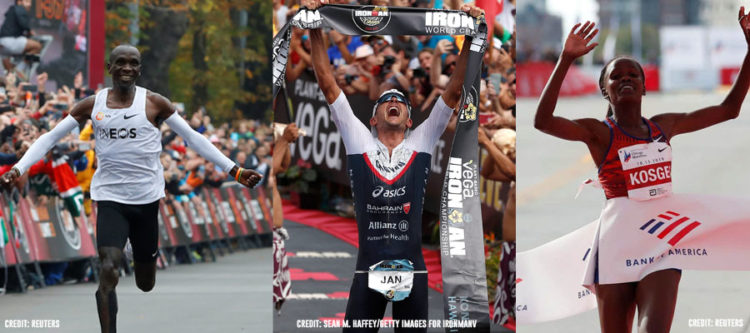I don’t know what it was about last weekend, but quite a few “barriers” in marathon and Ironman got busted through. Maybe the earth wobbled on its axis and gravity weakened slightly. More likely though, these three individuals put on a superhuman effort both physically and mentally and reaped the rewards for their hard work.
First, Eliud Kipchoge became the first man to run the marathon distance under two hours. Then, Jan Frodeno set a new course record for the Ironman World Championship, going nearly two minutes under the course record set last year. And last night just before I shut my eyes, I scrolled through Twitter and read that Brigid Kosgei broke the marathon world record set 17 years ago by Paula Radcliffe.
If you haven’t seen any of these yet, here are the highlight reels:
Oh yes, that’s right. I wasn’t present at any of their attempts, but the blessing of Internet connectivity and streaming coverage allowed me to witness two out of those three events live on my computer screen. It was simply the best weekend to be an endurance sport fan and geek out about how the limits of human endurance have been pushed yet again.
But what does it mean for the average/casual/recreational/age group athlete like myself? Well, looking at Kipchoge’s evenly-paced splits throughout his sub-2 hour marathon attempt would have been pretty demotivational on its own. His 10-kilometer split is only just a bit slower than my current 5-kilometer run capabilities. Does that mean I should just give up running because I’ll never be as good as him? Of course not.
It took 16 years for someone to shave off 80 seconds from the previous marathon world record for women. Many athletes had tried previously, going faster than world record pace in the first half only to fade in the second. Kosgei could have pulled back a bit and still won the race (she finished seven minutes ahead of second), but she had the guts to pull the trigger and go for it.
Due to injury, Frodeno missed out on last year’s fantastic conditions in Kona which set up fast bike splits (due to lack of headwinds) and a rash of sub-8 hour finishes, the first in the race’s tough history. But this year in somewhat less favorable conditions, he came back and put his stamp on the race as he put on a master class from start to finish, coming away with a new course record as well.
My personal takeaway from their exploits is to be inspired. They are, of course, immensely talented individuals who also have the world’s best support system in training and racing their respecctive events. But it is also their own hard work, determination, and belief that they are capable that have taken them to the finish line in such fashion.
“It’s about telling the world that anything is possible when you put in your heart and your mind,” said Kipchoge.
The barriers of endurance and performance that we once thought we could never break through? Well, they’re only barriers when we believe them to be.

